- Home
- Ken Follett
Fall of Giants Page 4
Fall of Giants Read online
Page 4
Chapter 4
CHAPTER FOUR - March 1914
"So," Billy said to his father, "all the books of the Bible were originally written in various languages and then translated into English. "
"Aye," said Da. "And the Roman Catholic Church tried to ban translations-they didn't want people like us reading the Bible for ourselves and arguing with the priests. "
Da was a bit un-Christian when he spoke of Catholics. He seemed to hate Catholicism more than atheism. But he loved an argument. "Well, then," said Billy, "where are the originals?"
"What originals?"
"The original books of the Bible, written in Hebrew and Greek. Where are they kept?"
They were sitting on opposite sides of the square table in the kitchen of the house in Wellington Row. It was midafternoon. Billy was home from the pit and had washed his hands and face, but still wore his work clothes. Da had hung up his suit jacket, and sat in his waistcoat and shirtsleeves, with a collar and tie-he would be going out again after dinner, to a union meeting. Mam was heating the stew on the fire. Gramper sat with them, listening to the discussion with a faint smile, as if he had heard it all before.
"Well, we don't have the actual originals," Da said. "They wore out, centuries ago. We have copies. "
"Where are the copies, then?"
"All different places-monasteries, museums. . . "
"They should be kept in one place. "
"But there's more than one copy of each book-and some are better than others. "
"How can one copy be better than another? Surely they're not different. "
"Yes. Over the years, human error crept in. "
This startled Billy. "Well, how do we know which is right?"
"That's a study called textual scholarship-comparing the different versions and coming up with an agreed text. "
Billy was shocked. "You mean there isn't an indisputable book that is the actual Word of God? Men argue about it and make a judgment?"
"Yes. "
"Well, how do we know they're right?"
Da smiled knowingly, a sure sign that his back was to the wall. "We believe that if they work in prayerful humility, God will guide their labors. "
"But what if they don't?"
Mam put four bowls on the table. "Don't argue with your father," she said. She cut four thick slices off a loaf of bread.
Gramper said: "Leave him be, Cara my girl. Let the boy ask his questions. "
Da said: "We have faith in God's power to ensure that his Word comes to us as he would wish. "
"You're completely illogical!"
Mam interrupted again. "Don't speak to your father like that! You're still a boy, you don't know anything. "
Billy ignored her. "Why didn't God guide the labors of the copiers, and stop them making mistakes, if he really wanted us to know His Word?"
Da said: "Some things are not given to us to understand. "
That answer was the least convincing of all, and Billy ignored it. "If the copiers could make mistakes, obviously the textual scholars could too. "
"We must have faith, Billy. "
"Faith in the Word of God, yes-not faith in a lot of professors of Greek!"
Mam sat at the table and pushed her graying hair out of her eyes. "So you are right, and everyone else is wrong, as usual, I suppose?"
This frequently used ploy always stung him, because it seemed justified. It was not possible that he was wiser than everyone else. "It's not me," he protested. "It's logic!"
"Oh, you and your old logic," said his mother. "Eat your dinner. "
The door opened and Mrs. Dai Ponies walked in. This was normal in Wellington Row: only strangers knocked. Mrs. Dai wore a pinafore and a man's boots on her feet: whatever she had to say was so urgent that she had not even put on a hat before leaving her house. Visibly agitated, she brandished a sheet of paper. "I'm being thrown out!" she said. "What am I supposed to do?"
Da stood up and gave her his chair. "Sit down by here and catch your breath, Mrs. Dai Ponies," he said calmly. "Let me have a read of that letter, now. " He took it from her red, knotted hand and laid it flat on the table.
Billy could see that it was typed on the letterhead of Celtic Minerals.
"'Dear Mrs. Evans,'" Da read aloud. "'The house at the above address is now required for a working miner. '" Celtic Minerals had built most of the houses in Aberowen. Over the years, some had been sold to their occupiers, including the one the Williams family lived in; but most were still rented to miners. "'In accordance with the terms of your lease, I-'" Da paused, and Billy could see he was shocked. "'I hereby give you two weeks' notice to quit!'" he finished.
Mam said: "Notice to quit-and her husband buried not six weeks ago!"
Mrs. Dai cried: "Where am I to go, with five children?"
Billy was shocked, too. How could the company do this to a woman whose husband had been killed in their pit?
"It's signed 'Perceval Jones, Chairman of the Board,' at the bottom," Da finished.
Billy said: "What lease? I didn't know miners had leases. "
Da said to him: "There's no written lease, but the law says there's an implied contract. We've already fought that battle and lost. " He turned to Mrs. Dai. "The house goes with the job, in theory, but widows are usually allowed to stay on. Sometimes they leave anyway, and go to live elsewhere, perhaps with their parents. Often they remarry, to another miner, and he takes over the lease. Usually they have at least one boy who becomes a miner when he's old enough. It's not really in the company's interest to throw widows out. "
"So why do they want to get rid of me and my children?" wailed Mrs. Dai.
Gramper said: "Perceval Jones is in a hurry. He must think the price of coal is going up. That'll be why he started the Sunday shift. "
Da nodded. "They want higher production, that's for sure, whatever the reason. But they're not going to get it by evicting widows. " He stood up. "Not if I can help it. "
{II}
Eight women were being evicted, all widows of men who had died in the explosion. They had received identical letters from Perceval Jones, as Da established that afternoon when he visited each woman in turn, taking Billy with him. Their reactions varied from the hysterics of Mrs. Hywel Jones, who could not stop crying, to the grim fatalism of Mrs. Roley Hughes, who said this country needed a guillotine like they had in Paris for men like Perceval Jones.
Billy was boiling with outrage. Was it not enough that these women had lost their men to the pit? Must they be homeless as well as husbandless? "Can the company do this, Da?" he said as he and his father walked down the mean gray terraces to the pithead.
"Only if we let them, boy. The working class are more numerous than the ruling class, and stronger. They depend on us for everything. We provide their food and build their houses and make their clothes, and without us they die. They can't do anything unless we let them. Always remember that. "
They went into the manager's office, stuffing their caps into their pockets. "Good afternoon, Mr. Williams," said Spotty Llewellyn nervously. "If you would just wait a minute, I'll ask if Mr. Morgan can see you. "
"Don't be daft, boy, of course he'll see me," said Da, and without waiting he walked into the inner office. Billy followed.
Maldwyn Morgan was looking at a ledger, but Billy had a feeling he was only pretending. He looked up, his pink cheeks closely shaved as always. "Come in, Williams," he said unnecessarily. Unlike many men, he was not afraid of Da. Morgan was Aberowen-born, the son of a schoolmaster, and had studied engineering. He and Da were similar, Billy realized: intelligent, self-righteous, and stubborn.
"You know what I've come about, Mr. Morgan," said Da.
"I can guess, but tell me anyway. "
"I want you to withdraw these eviction notices. "
"The company needs the houses for miners. "
"There will be trouble. "
"Are you threatening me?"
&nb
sp; "Don't get on your high horse," Da said mildly. "These women lost their husbands in your pit. Don't you feel responsible for them?"
Morgan tilted up his chin defensively. "The public inquiry found that the explosion was not caused by the company's negligence. "
Billy wanted to ask him how an intelligent man could say such a thing and not feel ashamed of himself.
Da said: "The inquiry found a list of violations as long as the train to Paddington-electrical equipment not shielded, no breathing apparatus, no proper fire engine-"
"But the violations did not cause the explosion, or the deaths of miners. "
"The violations could not be proved to have caused the explosion or the deaths. "
Morgan shifted uncomfortably in his chair. "You didn't come here to argue about the inquiry. "
"I came here to get you to see reason. As we speak, the news of these letters is going around the town. " Da gestured at the window, and Billy saw that the winter sun was going down behind the mountain. "Men are rehearsing with choirs, drinking in pubs, going to prayer meetings, playing chess-and they're all talking about the eviction of the widows. And you can bet your boots they're angry. "
"I have to ask you again: are you trying to intimidate the company?"
Billy wanted to throttle the man, but Da sighed. "Look here, Maldwyn, we've known each other since school days. Be reasonable, now. You know there are men in the union who will be more aggressive than me. " Da was talking about Tommy Griffiths's father. Len Griffiths believed in revolution, and he always hoped the next dispute would be the spark that lit the conflagration. He also wanted Da's job. He could be relied upon to propose drastic measures.
Morgan said: "Are you telling me you're calling a strike?"
"I'm telling you the men will be angry. What they will do I can't predict. But I don't want trouble and you don't want trouble. We're talking about eight houses out of what, eight hundred? I've come here to ask you, is it worth it?"
"The company has made its decision," Morgan said, and Billy felt intuitively that Morgan did not agree with the company.
"Ask the board of directors to reconsider. What harm could that do?"
Billy was impatient with Da's mild words. Surely he should raise his voice, and point his finger, and accuse Morgan of the ruthless cruelty of which the company was obviously guilty? That was what Len Griffiths would have done.
Morgan was unmoved. "I'm here to carry out the board's decisions, not question them. "
"So the evictions have already been approved by the board," Da said.
Morgan looked flustered. "I didn't say that. "
But he had implied it, Billy thought, thanks to Da's clever questioning. Maybe mildness was not such a bad idea.
Da changed tack. "What if I could find you eight houses where the occupiers are prepared to take in new miners as lodgers?"
"These men have families. "
Da said slowly and deliberately: "We could work out a compromise, if you were willing. "
"The company must have the power to manage its own affairs. "
"Regardless of the consequences to others?"
"This is our coal mine. The company surveyed the land, negotiated with the earl, dug the pit, and bought the machinery, and it built the houses for the miners to live in. We paid for all this and we own it, and we won't be told what to do with it by anyone else. "
Da put his cap on. "You didn't put the coal in the earth, though, did you, Maldwyn?" he said. "God did that. "
{III}
Da tried to book the assembly rooms of the town hall for a gathering at seven thirty the following night, but the space was already taken by the Aberowen Amateur Dramatic Club, who were rehearsing Henry IV, Part One, so Da decided the miners would meet at Bethesda Chapel. Billy and Da, with Len and Tommy Griffiths and a few other active union members, went around the town announcing the meeting orally and pinning up handwritten notices in pubs and chapels.
By a quarter past seven next evening the chapel was packed. The widows sat in a row at the front, and everyone else stood. Billy was at the side near the front, where he could see the men's faces. Tommy Griffiths stood beside him.
Billy was proud of his da for his boldness, his cleverness, and the fact that he had put his cap back on before leaving Morgan's office. All the same he wished Da had been more aggressive. He should have talked to Morgan the way he talked to the congregation of Bethesda, predicting hellfire and brimstone for those who refused to see the plain truth.
At exactly seven thirty, Da called for quiet. In his authoritative preaching voice he read out the letter from Perceval Jones to Mrs. Dai Ponies. "The identical letter have been sent to eight widows of men killed in the explosion down the pit six weeks ago. "
Several men called out: "Shame!"
"It is our rule that men speak when called upon by the chairman of the meeting, and not otherwise, so that each may be heard in his turn, and I will thank you for observing the rule, even on an occasion such as this when feelings run high. "
Someone called out: "It's a bloody disgrace!"
"Now, now, Griff Pritchard, no swearing, please. This is a chapel and, besides, there are ladies present. "
Two or three of the men said: "Hear, hear. " They pronounced the word to rhyme with "fur. "
Griff Pritchard, who had been in the Two Crowns since the shift ended that afternoon, said: "Sorry, Mr. Williams. "
"I held a meeting yesterday with the colliery manager, and asked him formally to withdraw the eviction notices, but he refused. He implied that the board of directors had made the decision, and it was not in his power to change it, or even question it. I pressed him to discuss alternatives, but he said the company had the right to manage its affairs without interference. That is all the information I have for you. " That was a bit low-key, Billy thought. He wanted Da to call for revolution. But Da just pointed to a man who had his hand up. "John Jones the Shop. "
"I've lived in number twenty-three Gordon Terrace all my life," said Jones. "I was born there and I'm still there. But my father died when I was eleven. Very hard it was, too, for my mam, but she was allowed to stay. When I was thirteen I went down the pit, and now I pay the rent. That's how it's always been. No one said anything about throwing us out. "
"Thank you, John Jones. Have you got a motion to propose?"
"No, I'm just saying. "
"I have a motion," said a new voice. "Strike!"
There was a chorus of agreement.
Billy's father said: "Dai Crybaby. "
"Here's how I see it," said the captain of the town's rugby team. "We can't let the company get away with this. If they're allowed to evict widows, none of us can feel that our families have any security. A man could work all his life for Celtic Minerals and die on the job, and two weeks later his family could be out on the street. Dai Union have been to the office and tried to talk sense to Gone-to-Merthyr Morgan, but it haven't done no good, so we got no alternative but to strike. "
"Thank you, Dai," said Da. "Should I take that as a formal motion for strike action?"
"Aye. "
Billy was surprised that Da had accepted that so quickly. He knew his father wanted to avoid a strike.
"Vote!" someone shouted.
Da said: "Before I put the proposal to a vote, we need to decide when the strike should take place. "
Ah, Billy thought, he's not accepting it.
Da went on: "We might consider starting on Monday. Between now and then, while we work on, the threat of a strike might make the directors see sense-and we could get what we want without any loss of earnings. "
Da was arguing for postponement as the next best thing, Billy realized.
But Len Griffiths had come to the same conclusion. "May I speak, Mr. Chairman?" he said. Tommy's father had a bald dome with a fringe of black hair, and a black mustache. He stepped forward and stood next to Da, facing the crowd, so that it looked as if t
he two of them had equal authority. The men went quiet. Len, like Da and Dai Crybaby, was among a handful of people they always heard in respectful silence. "I ask, is it wise to give the company four days' grace? Suppose they don't change their minds-which seems a strong possibility, given how stubborn they have been so far. Then we'll get to Monday with nothing achieved, and the widows will have that much less time left. " He raised his voice slightly for rhetorical effect. "I say, comrades: don't give an inch!"
There was a cheer, and Billy joined in.
"Thank you, Len," said Da. "I have two motions on the table, then: Strike tomorrow, or strike Monday. Who else would like to speak?"
Billy watched his father manage the meeting. The next man called was Giuseppe "Joey" Ponti, top soloist with the Aberowen Male Voice Choir, older brother of Billy's schoolmate Johnny. Despite his Italian name, he had been born in Aberowen and spoke with the same accent as every other man in the room. He, too, argued for an immediate strike.
Da then said: "In fairness, may I have a speaker in favor of striking on Monday?"
Billy wondered why Da did not throw his personal authority into the balance. If he argued for Monday he might change their minds. But then, if he failed, he would be in an awkward position, leading a strike that he had argued against. Da was not completely free to say what he felt, Billy realized.
The discussion ranged widely. Coal stocks were high, so the management could hold out; but demand was high too, and they would want to sell while they could. Spring was coming, so miners' families would soon be able to manage without their ration of free coal. The miners' case was well grounded in long-established practise, but the letter of the law was on the management's side.
Da let the discussion run on, and some of the speeches became tedious. Billy wondered what his father's motivation was, and guessed he was hoping that heads would cool. But in the end he had to put it to the vote.
"First, all those in favor of no strike at all. "
A few men raised their hands.
"Next, those in favor of a strike starting Monday. "
There was a strong vote for this, but Billy was not sure if it was enough to win. It would depend upon how many men abstained.
"Finally, those in favor of a strike starting tomorrow. "
There was a cheer, and a forest of arms waved in the air. There could be no doubt about the result.
"The motion to strike tomorrow is passed," Da said. No one proposed a count.
The meeting broke up. As they went out, Tommy said brightly: "Day off, tomorrow, then. "
"Aye," said Billy. "And no money to spend. "
{IV}
The first time Fitz went with a prostitute, he had tried to kiss her-not because he wanted to, but he assumed it was the done thing. "I don't kiss," she had said abruptly in her cockney accent, and after that he had never tried it again. Bing Westhampton said a lot of prostitutes refused to kiss, which was odd, considering what other intimacies they permitted. Perhaps that trivial prohibition preserved a remnant of their dignity.
Girls of Fitz's social class were not supposed to kiss anyone before marriage. They did, of course, but only in rare moments of brief privacy, in a suddenly deserted side room at a ball, or behind a rhododendron bush in a country garden. There was never time for passion to develop.
The only woman Fitz had kissed properly was his wife, Bea. She gave him her body as a cook might present a special cake, fragrant and sugared and beautifully decorated for his enjoyment. She let him do anything, but made no demands. She offered her lips for him to kiss, and opened her mouth to his tongue, but he never felt she was hungry for his touch.
Ethel kissed as if she had one minute left to live.
They stood in the Gardenia Suite, beside the bed covered with its dust sheet, wrapped in each other's arms. She sucked his tongue and bit his lips and licked his throat, and at the same time she stroked his hair, clutched the back of his neck, and thrust her hands under his waistcoat so that she could rub her palms against his chest. When at last they broke apart, out of breath, she put her hands either side of his face, holding his head still, staring at him, and said: "You are so beautiful. "
He sat on the edge of the bed, holding her hands, and she stood in front of him. He knew that some men regularly seduced their servants, but he did not. When he was fifteen he had fallen in love with a parlor maid at the London house: his mother had guessed it within a few days and sacked the girl immediately. His father had smiled and said: "Good choice, though. " Since then he had not touched an employee. But he could not resist Ethel.
She said: "Why have you come back? You were expected to stay in London all of May. "
"I wanted to see you. " He could tell that she found it hard to believe him. "I kept thinking about you, all day, every day, and I just had to come back. "
She bent down and kissed him again. Holding the kiss, he slowly fell back on the bed, pulling her with him until she was lying on top of him. She was so slim that she weighed no more than a child. Her hair escaped from its pins and he buried his fingers in her glossy curls.
After a while she rolled off and lay beside him, panting. He leaned on his elbow and looked at her. She had said he was beautiful, but right now she was the prettiest thing he had ever seen. Her cheeks were flushed, her hair was mussed, and her red lips were moist and parted. Her dark eyes gazed at him with adoration.
He put his hand on her hip, then stroked her thigh. She covered his hand with her own, holding it still, as if afraid he was going too far. She said: "Why do they call you Fitz? Your name is Edward, isn't it?"
She was talking in an attempt to let their passion cool, he felt sure. "It started at school," he said. "All the boys had nicknames. Then Walter von Ulrich came home with me one vacation, and Maud picked it up from him. "
"Before that, what did your parents call you?"
"Teddy. "
"Teddy," she said, trying it on her tongue. "I like it better than Fitz. "
He started to stroke her thigh again, and this time she let him. Kissing her, he slowly pulled up the long skirt of her black housekeeper's dress. She wore calf-length stockings, and he stroked her bare knees. Above the knee she had long cotton underdrawers. He touched her legs through the cotton, then moved his hand to the fork of her thighs. When he touched her there, she groaned and thrust upward against his hand.
"Take them off," he whispered.
"No!"
He found the drawstring at the waist. It was tied in a bow. He undid the knot with a tug.
She put her hand over his again. "Stop. "
"I just want to touch you there. "
"I want it more than you do," she said. "But no. "
He knelt up on the bed. "We won't do anything you don't want," he said. "I promise. " Then he took the waist of her drawers in both hands and ripped the material apart. She gasped with shock, but she did not protest. He lay down again and explored her with his hand. She parted her legs immediately. Her eyes were closed and she was breathing hard, as if she had been running. He guessed that no one had done this to her before, and a faint voice told him he should not take advantage of her innocence, but he was too far gone in desire to listen.
He unbuttoned his trousers and lay on top of her.
"No," she said.
"Please. "
"What if I fall for a baby?"
"I'll withdraw before the end. "
"Promise?"
"I promise," he said, and he slid inside her.
He felt an obstruction. She was a virgin. His conscience spoke again, and this time its voice was not so faint. He stopped. But now it was she who was too far gone. She grasped his hips and pulled him into her, raising herself slightly at the same time. He felt something break, and she gave a sharp cry of pain, then the obstruction was gone. As he moved in and out, she matched his rhythm eagerly. She opened her eyes and looked at his face. "Oh, Teddy, Teddy," she said, and he saw
that she loved him. The thought moved him almost to tears, and at the same time excited him beyond control, and his climax came unexpectedly soon. In desperate haste he withdrew, and spilled his seed on her thigh with a groan of passion mingled with disappointment. She put her hand behind his head and pulled his face to hers, kissing him wildly, then she closed her eyes and gave a small cry that sounded like surprise and pleasure; and then it was over.
I hope I pulled out in time, he thought.
{V}
Ethel went about her work as usual, but all the time she felt as if she had a secret diamond in her pocket that she could touch from time to time, feeling its slick surfaces and its sharp edges when no one was looking.
In her more sober moments she worried about what this love meant and where it was going, and now and again she was horrified by the thought of what her God-fearing socialist father would think if he found out. But most of the time she just felt as if she was dropping through the air with no way to arrest her fall. She loved the way he walked, the way he smelled, his clothes, his careful good manners, his air of authority. She also loved the way he occasionally looked bewildered. And when he came out of his wife's room with that hurt look on his face, she could cry. She was in love and out of control.
Most days she spoke to him at least once, and they usually managed a few moments alone and a long, yearning kiss. Just kissing him made her wet, and she sometimes had to wash her drawers in the middle of the day. He took other liberties, too, whenever there was a chance, touching her body all over, which made her more excited. Twice more they had been able to meet in the Gardenia Suite and lie on the bed.
One thing puzzled Ethel: both times they had lain together, Fitz had bitten her, quite hard, once on her inner thigh and once on her breast. It had caused her to give a cry of pain, hastily muffled. The cry seemed to inflame him more. And, although it hurt, at the same time she, too, was aroused by the bite, or at least by the thought that his desire for her was so overwhelming that he was driven to express it that way. She had no idea whether this was normal, and no one she could ask.
But her main worry was that one day Fitz would fail to withdraw at the crucial moment. The tension was so high that it was almost a relief when he and Princess Bea had to go back to London.
Before he went she persuaded him to feed the children of the striking miners. "Not the parents, because you can't be seen to take sides," she said. "Just the little boys and girls. The strike has been on for two weeks now, and they're on starvation rations. It wouldn't cost you much. There would be about five hundred of them, I'd guess. They'd love you for it, Teddy. "
"We could put up a marquee on the lawn," he said, lying on the bed in the Gardenia Suite with his trousers unbuttoned and his head in her lap.
"And we can make the food here in the kitchens," Ethel said enthusiastically. "A stew with meat and potatoes in it, and all the bread they can eat. "
"And a suet pudding with currants in it, eh?"
Did he love her? she wondered. At that moment, she felt he would have done anything she asked: given her jewels, taken her to Paris, bought her parents a nice house. She did not want any of those things-but what did she want? She did not know, and she refused to let her happiness be blighted by unanswerable questions about the future.
A few days later she stood on the East Lawn at midday on a Saturday, watching the children of Aberowen tuck into their first free dinner. Fitz did not know that this was better food than they got when their fathers were working. Suet pudding with currants, indeed! The parents were not allowed in, but most of the mothers stood outside the gates, watching their lucky offspring. Glancing that way, she saw someone waving at her, and she walked down the drive.
The group at the gate was mostly women: men did not look after children, even during a strike. They gathered around Ethel, looking agitated.
"What's happened?" she said.
Mrs. Dai Ponies answered her. "Everyone have been evicted!"
"Everyone?" Ethel said, not understanding. "Who?"
"All the miners who rent their houses from Celtic Minerals. "
"Good grief!" Ethel was horrified. "God save us all. " Shock was followed by puzzlement. "But why? How does that help the company? They'll have no miners left. "
"These men," said Mrs. Dai. "Once they get into a fight, all they care about is winning. They won't give in, whatever the cost. They're all the same. Not that I wouldn't have my Dai back, if I could. "
"This is awful. " How could the company find enough blacklegs to keep the pit going? she wondered. If they closed the mine, the town would die. There would be no customers left for the shops, no children to go to the schools, no patients for the doctors. . . Her father, too, would have no work. No one had expected Perceval Jones to be so obstinate.
Mrs. Dai said: "I wonder what the king would say, if he knew. "
Ethel wondered, too. The king had seemed to show real compassion. But he probably did not know the widows had been evicted.
And then she was struck by a thought. "Perhaps you should tell him," she said.
Mrs. Dai laughed. "I will, next time I sees him. "
"You could write him a letter. "
"Don't talk daft, now, Eth. "
"I mean it. You should do it. " She looked around the group. "A letter signed by widows the king visited, telling him you are being thrown out of your homes and the town is on strike. He'd have to take notice, surely?"
Mrs. Dai looked scared. "I wouldn't like to get into trouble. "
Mrs. Minnie Ponti, a thin blond woman of strong opinions, said to her: "You have no husband and no home and nowhere to go-how much more trouble could you be in?"
"That's true enough. But I wouldn't know what to say. Do you put 'Dear King,' or 'Dear George the Fifth,' or what?"
Ethel said: "You put: 'Sir, with my humble duty. ' I know all that rubbish, from working here. Let's do it now. Come into the servants' hall. "
"Will it be all right?"
"I'm the housekeeper now, Mrs. Dai. I'm the one who says what's all right. "
The women followed her up the drive and around the back of the house to the kitchen. They sat around the servants' dining table, and the cook made a pot of tea. Ethel had a stock of plain writing paper that she used for correspondence with tradesmen.
"'Sir, with our humble duty,'" she said, writing. "What next?"
Mrs. Dai Ponies said: "'Forgive our cheek in writing to Your Majesty. '"
"No," Ethel said decisively. "Don't apologize. He's our king, we're entitled to petition him. Let's say: 'We are the widows Your Majesty visited in Aberowen after the pit explosion. '"
"Very good," said Mrs. Ponti.
Ethel went on: "'We were honored by your visit and comforted by your kind condolences, and the gracious sympathy of Her Majesty the queen. '"
Mrs. Dai said: "You've got the gift for this, like your father. "
Mrs. Ponti said: "That's enough soft soap, though. "
"All right. Now then. 'We are asking for your help as our king. Because our husbands are dead, we are being evicted from our homes. '"
"By Celtic Minerals," put in Mrs. Ponti.
"'By Celtic Minerals. The whole pit have gone on strike for us but now they are being evicted too. '"
"Don't make it too long," said Mrs. Dai. "He might be too busy to read it. "
"All right, then. Let's finish with: 'Is this the kind of thing that should be allowed in your kingdom?'"
Mrs. Ponti said: "It's a bit tame. "
"No, it's good," said Mrs. Dai. "It appeals to his sense of right and wrong. "
Ethel said: "'We have the honor to be, sir, Your Majesty's most humble and obedient servants. '"
"Do we have to have that?" said Mrs. Ponti. "I'm not a servant. No offense, Ethel. "
"It's the normal thing. The earl puts it when he writes a letter to The Times. "
"All right, then. "
Ethel p
assed the letter around the table. "Put your addresses next to your signatures. "
Mrs. Ponti said: "My writing's awful, you sign my name. "
Ethel was about to protest, then it occurred to her that Mrs. Ponti might be illiterate, so she did not argue, but simply wrote: "Mrs. Minnie Ponti, 19 Wellington Row. "
She addressed the envelope:
His Majesty the King
Buckingham Palace
London
She sealed the letter and stuck on a stamp. "There we are, then," she said. The women gave her a round of applause.
She posted the letter the same day.
No reply was ever received.
{VI}
The last Saturday in March was a gray day in South Wales. Low clouds hid the mountaintops and a tireless drizzle fell on Aberowen. Ethel and most of the servants at Tŷ Gwyn left their posts-the earl and princess were away in London-and walked into town.
Policemen had been sent from London to enforce the evictions, and they stood on every street, their heavy raincoats dripping. The Widows' Strike was national news, and reporters from Cardiff and London had come up on the first morning train, smoking cigarettes and writing in notebooks. There was even a big camera on a tripod.
Ethel stood with her family outside their house and watched. Da was employed by the union, not by Celtic Minerals, and he owned their house; but most of their neighbors were being thrown out. During the course of the morning, they brought their possessions out onto the streets: beds, tables and chairs, cooking pots and chamber pots, a framed picture, a clock, an orange box of crockery and cutlery, a few clothes wrapped in newspaper and tied with string. A small pile of near-worthless goods stood like a sacrificial offering outside each door.
Da's face was a mask of suppressed rage. Billy looked as if he wanted to have a fight with someone. Gramper kept shaking his head and saying: "I never seen the like, not in all my seventy years. " Mam just looked grim.
Ethel cried and could not stop.
Some of the miners had got other jobs, but it was not easy: a miner could not adapt readily to the work of a shop assistant or a bus conductor, and employers knew this and turned them away when they saw the coal dust under their fingernails. Half a dozen had become merchant sailors, signing on as stokers and getting a pay advance to give to their wives before they left. A few were going to Cardiff or Swansea, hoping for jobs in the steelworks. Many were moving in with relatives in neighboring towns. The rest were simply crowding into another Aberowen house with a non-mining family until the strike was settled.
"The king never replied to the widows' letter," Ethel said to Da.
"You handled it wrong," he said bluntly. "Look at your Mrs. Pankhurst. I don't believe in votes for women, but she knows how to get noticed. "
"What should I have done, got myself arrested?"
"You don't need to go that far. If I'd known what you were doing, I'd have told you to send a copy of the letter to the Western Mail. "
"I never thought of that. " Ethel was disheartened to think that she could have done something to prevent these evictions, and had failed.
"The newspaper would have asked the palace whether they had received the letter, and it would have been hard for the king to say he was just going to ignore it. "
"Oh, dammo, I wish I'd asked your advice. "
"Don't swear," her mother said.
"Sorry, Mam. "
The London policemen looked on in bewilderment, not understanding the foolish pride and stubbornness that had led to this. Perceval Jones was nowhere to be seen. A reporter from the Daily Mail asked Da for an interview, but the newspaper was hostile to workers, and Da refused.
There were not enough handcarts in town, so people took it in turns to move their goods. The process took hours, but by midafternoon the last pile of possessions had gone, and the keys had been left sticking out of the locks on the front doors. The policemen went back to London.
Ethel stayed in the street for a while. The windows of the empty houses looked blankly back at her, and the rainwater ran down the street pointlessly. She looked across the wet gray slates of the roofs, downhill to the scattered pithead buildings in the valley bottom. She could see a cat walking along a railway line, but otherwise there was no movement. No smoke came from the engine room, and the great twin wheels of the winding gear stood on top of their tower, motionless and redundant in the soft relentless rain.

 The Pillars of the Earth
The Pillars of the Earth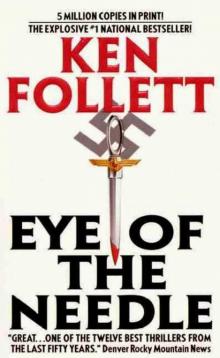 Eye Of The Needle
Eye Of The Needle Lie Down With Lions
Lie Down With Lions Winter of the World
Winter of the World Triple
Triple World Without End
World Without End Fall of Giants
Fall of Giants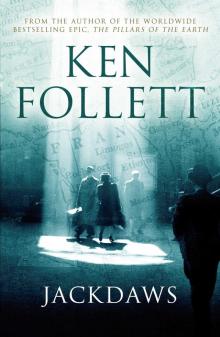 Jackdaws
Jackdaws Hornet Flight
Hornet Flight Whiteout
Whiteout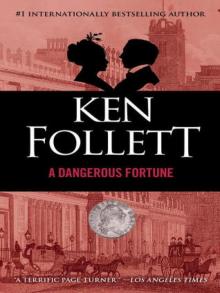 A Dangerous Fortune
A Dangerous Fortune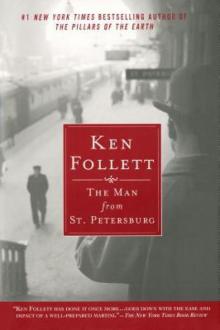 The Man From St. Petersburg
The Man From St. Petersburg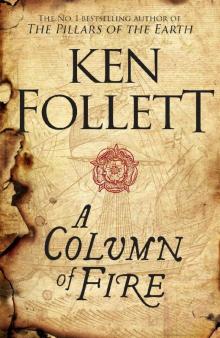 A Column of Fire
A Column of Fire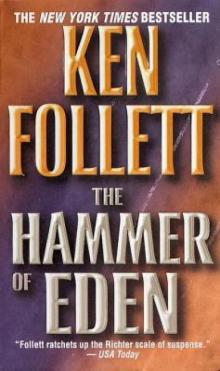 The Hammer of Eden
The Hammer of Eden On Wings of Eagles
On Wings of Eagles The Evening and the Morning
The Evening and the Morning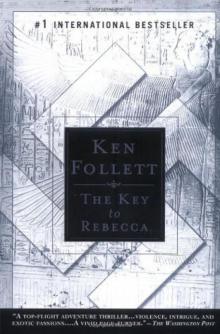 The Key to Rebecca
The Key to Rebecca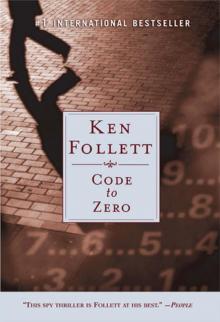 Code to Zero
Code to Zero Paper Money
Paper Money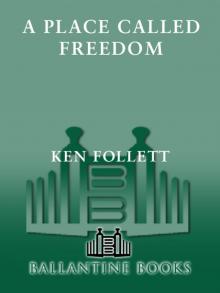 A Place Called Freedom
A Place Called Freedom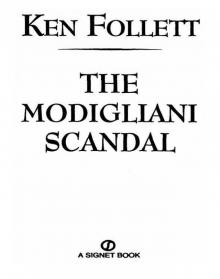 The Modigliani Scandal
The Modigliani Scandal Triple (1991)
Triple (1991)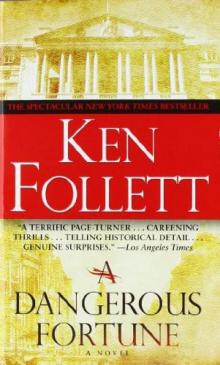 A Dangerous Fortune (1994)
A Dangerous Fortune (1994)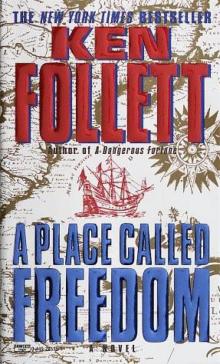 A Place Called Freedom (1995)
A Place Called Freedom (1995) Winter of the World (Century Trilogy 2)
Winter of the World (Century Trilogy 2) Code to Zero (2000)
Code to Zero (2000) On Wings Of Eagles (1990)
On Wings Of Eagles (1990) Storm Island
Storm Island Fall of Giants (The Century Trilogy)
Fall of Giants (The Century Trilogy)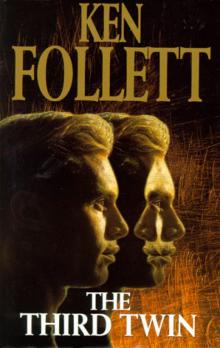 the Third Twin (1996)
the Third Twin (1996)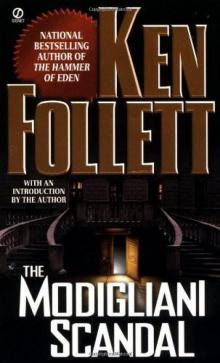 The Modigliani Scandal (1976)
The Modigliani Scandal (1976)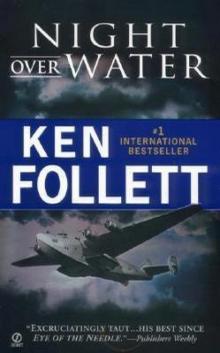 Night Over Water
Night Over Water